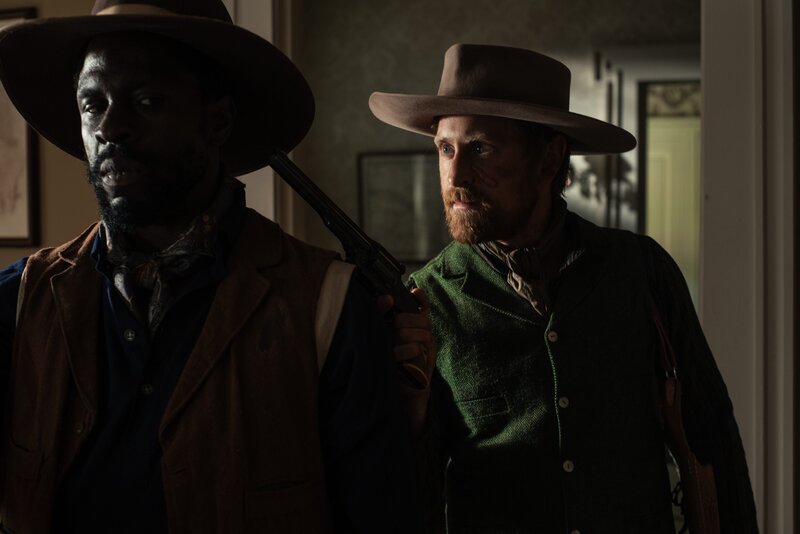
Pain and Redemption Ride Side by Side
MOVIE REVIEW
Trail of Vengeance
–
Genre: Western
Year Released: 2025
Runtime: 1h 38m
Director(s): Johnny Remo
Writer(s): Johnny Remo, Daniel Beckman
Cast: Jeff Fahey, Graham Greene, Rumer Willis, Jeremy Sumpter, James Landry Hébert, Gbenga Akinnagbe, Eric Nelsen, Connor Esterson, Ryan Francis, Daniel Backman
Where to Watch: available in select theaters and on-demand platforms Friday, May 23, 2025
RAVING REVIEW: It’s not often a Western trades in its six-shooters (I mean they’re still there, just not the main focus) for something quieter and more introspective, but this one does just that. Instead of chasing highs, it lingers in the aftermath, exploring grief and justice with characters who feel like they’ve lived long before the opening credits. What unfolds is a story that trusts its audience to sit with ambiguity, and while it doesn’t solve every problem it introduces, the effort to do something different is undeniable. I’ll be the first to admit Westerns aren’t my favorite genre, but this one does something special.
What sets this one apart is its refusal to go through the motions. Rather than leading with action or spectacle, it opens on personal loss, letting the emotional aftershocks guide everything. Set against the backdrop of 1875, the story centers on a woman whose life is forever altered by the murder of her husband. She’s not looking to reclaim peace—she’s looking for truth, or whatever’s left. Her path leads her to a man with his complicated past: a former Pinkerton agent carrying the weight from personal regrets and the injustices of a system that turned its back on him.
The narrative doesn’t rush to pair these two. Their bond forms gradually, stitched together by shared pain rather than romantic chemistry or plot convenience. Their dynamic provides the film’s emotional spur, and this human thread—two people finding reluctant trust—keeps the story from becoming just another revenge story. The quiet moments they share are just as important as the louder ones, if not more so.
Performance-wise, Rumer Willis anchors the lead role as Katherine Atherton with quiet control. She doesn’t play the part for sympathy; instead, her portrayal leans into conviction, allowing emotion to break through only when it matters most. Opposite her, Gbenga Akinnagbe takes on a role that could’ve easily fallen into a stereotype as John Scobell. Instead, he plays Scobell with restraint, someone trying to find meaning in a world that keeps pulling away from him. Their scenes together never feel forced—they breathe, and they evolve.
Director Johnny Remo takes a measured approach here. Co-writing the script with Daniel Backman, he avoids the temptation to dress the film in genre clichés. He knows the kind of story he wants to tell and sticks with it: not about revenge, but what it costs to seek justice when the people in charge are not interested in delivering it. This isn’t about heroic redemption but confronting wounds that don’t easily close. Remo’s role behind the camera ensures that every creative decision—from framing to pacing—echoes that intention.
The supporting cast helps flesh out the story's texture without distracting from the core duo. Jeff Fahey as Colonel Davis brings a cold authority, never overplaying his role but still exuding the quiet threat of a man who knows how to exploit power. Graham Greene's Hoko is a calming presence, a counterweight to the film’s tension.
There’s also something refreshing about the way history is incorporated. Rather than drawing attention to itself, it’s built into character. Scobell’s identity echoes the legacy of the first Black Pinkerton agent, grounding his role in real-world weight without turning the film into a lecture. It’s a smart inclusion that adds dimension and invites further thought without pulling away from the story.
One of the strongest creative decisions is sidestepping a forced romance. The connection between Katherine and Scobell grows from necessity and trust, not from some artificial chemistry inserted to check a box. That respect for truth gives their relationship a depth that outlasts the runtime. It’s not just about whether justice is found—how two people can walk through fire together and still come out standing.
What ultimately gives the film staying power is its focus on refinement rather than reinvention. It doesn’t want to change the rules of the Western—it just wants to ask better questions within them—questions about loss, purpose, power, and what we owe to the people left behind. While not every moment lands and some characters fade into the background, the story's heart remains intact, beating quietly beneath the dust and silence. The film carves out space for thought and feeling. It may not rewrite the genre’s legacy, but asks it to look in the mirror. And that’s something worth watching.
Please visit https://linktr.ee/overlyhonestr for more reviews.
You can follow me on Letterboxd, Instagram, Twitter, and YouTube. My social media accounts can also be found on most platforms by searching for 'Overly Honest Reviews'.
I’m always happy to hear from my readers; please don't hesitate to say hello or send me any questions about movies.
[photo courtesy of SKIPSTONE PICTURES, SHOUT! STUDIOS]
DISCLAIMER:
At Overly Honest Movie Reviews, we value honesty and transparency. Occasionally, we receive complimentary items for review, including DVDs, Blu-rays, CDs, Vinyl Records, Books, and more. We assure you that these arrangements do not influence our reviews, as we are committed to providing unbiased and sincere evaluations. We aim to help you make informed entertainment choices regardless of our relationship with distributors or producers.
Amazon Affiliate Links:
Additionally, this site contains Amazon affiliate links. If you purchase through these links, we may receive a commission. This affiliate arrangement does not affect our commitment to honest reviews and helps support our site. We appreciate your trust and support in navigating these links.



Average Rating